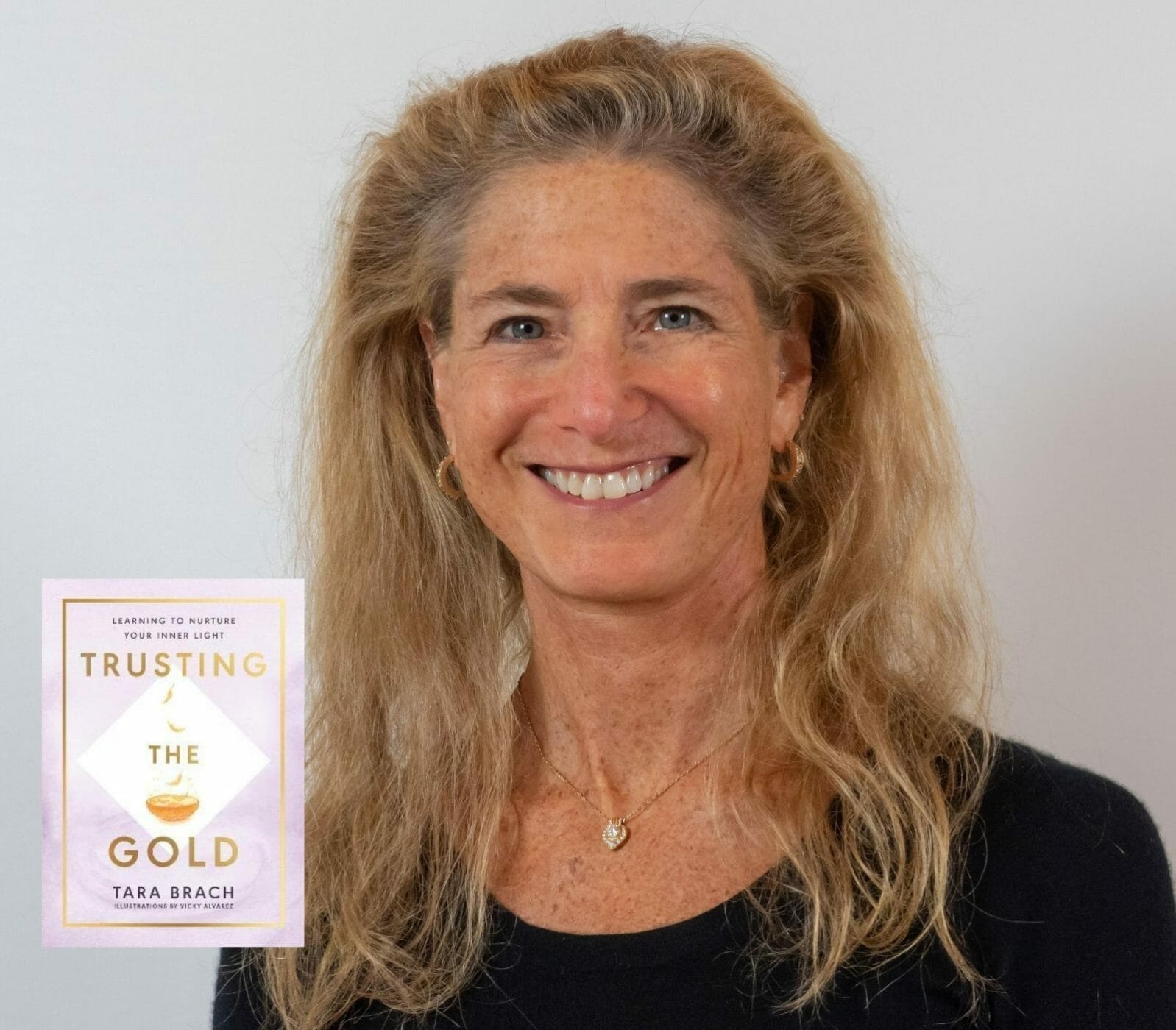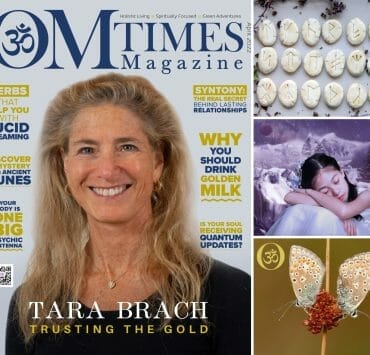Tara Brach: Trusting the Gold

I didn’t know, you know if I’d ever get better. I remember being in that hospital bed and remembering the words of one teacher, which were meet your edge and soften. And that’s kind of a felt sense description of radical Acceptance that we often are. We have our fist tight, and we’re tensing against experience. Radical Acceptance is opening to the experience within us, the edges, the hard stuff, and softening, making room for what’s there. And that became my practice where I would encounter what was there. And for me, there was the first level of what was, there was a lot of confusion and trying to control things and figure things out, and I’d feel under that and sense the fear and, okay, meet at an edge softened.
And as I softened and opened with radical Acceptance to the fear that was there, what came up was a real sense of grief, of losing my life. And as I opened to that grief and wept and sobbed, I just found deep, deep inside a kind of tender spaciousness that loves life. So I was reconnecting with, with essence, the space that has room for what’s going on with the ocean that can hold the waves, and the pathway was this radical Acceptance and this deep compassion. So I share that because now I’ve, over the years, developed some pathways and strategies that serve a lot of people, and I’ll share one of the main ones is with the acronym RAIN, which we can come back to. But the essence is just what I’m describing, where we see what’s going on in the moment, the fear or the grief inside us, the hate, the anger, whatever it is, and open to it, let it be there.
Victor Fuhrman: I want to talk about Finding true refuge, which came after radical Acceptance. Finding true refuge, peace, and freedom in your own awakened heart and true refuge meditation were difficult times. Was that your first audio?
Tara Brach: My first audio was radical Acceptance because that was the first book I wrote.
Victor Fuhrman: So, with finding true refuge, are there simple ways of finding refuge in our current world situation?
Tara Brach: Oh, that’s a, a wonderful question. I think it’s one of the most important questions that we can ask. When I wrote the book, it came out of sickness. I was sharing with you that I spent six years. I was unsure whether I’d recover, and what forced me to find a deeper way of living that wasn’t hitched to how well I felt. And this is the key point, and this is the key teaching in Buddhism is if your life, if your wellbeing is a hitch to feeling a certain way if it’s a hitch to having other people treat you a certain way, if it’s a hitch to certain finances, if it’s a hitch to the world being the way you think it should be, you’re going to be in trouble because we can’t control any of that. The only place where there’s some sense of being able to choose is that we can control our focus on how we respond to the moment.
That’s the place where we can find our superpowers. And for me, I remember one point when I was kind of really deep into feeling ill, and I had to give up all the things I loved, and I brought these practices of radical Acceptance and compassion to that experience. And I remember the deep prayer was, please let me live this life no matter what. To me, that is, that is pointing to refuge. No matter what is going on in this world, we can keep waking up and discovering love. We can keep discovering love and aliveness at the moment. And in the pathway, there is presence. So, the pathway to our refuge is presence. So, I think of our world today with its pandemic, climate crisis of democracy, racism and many conflicts, dividedness, and so much trauma.
So many people are trying to find refuge amidst all the uncertainty. And we do have a refuge that we can find if we’re willing to train presence. That refuge brings us to a place of collective loving, a sense of a field of loving and awareness that is timeless and bigger than and big enough for what our world is going through, but it takes practice. It sounds abstract to us, just like words, unless, at any given moment, we sense what’s going on. So I think we need to do it together. We need to come into presence together and find that shared loving awareness. That’s big enough.
Victor Fuhrman: Your next book was Radical Compassion, learning to love yourself and your world with the practice of RAIN. What is RAIN?
Tara Brach: Oh, RAIN is an acronym that stands for recognizing, allowing, investigating, and nurturing. And it’s a way of applying mindfulness and compassion to whatever challenge we have. And I’ve had people in the last number of years; I’ve had people tell me that RAIN saved their lives, especially through the pandemic. We talk about what can help us find refuge well through this pandemic for many people. RAIN was the practice that saved their life. One of the experiences had motivated me to write a book on RAIN, and radical compassion is a guidebook to using RAIN. It was when my mother, when she was in her early eighties, decided to move down here to Virginia and live with my husband, Jonathan, and myself. And she needed a lot of support in getting settled and going to doctor’s appointments and just establishing a life here.
That was right when I was really busy and overextended. And I was just flip-flopping between feeling guilty about not giving her enough energy and anxious about not having time for other commitments. And I remember one day she walked into my office to give me a new Yorker article. She thought I’d be interested in it. And I was fixated on my computer, writing a talk about loving-kindness, barely looked up at her. She just graciously laid down the article and started walking away. And I was watching her retreating forum. And I thought to myself. I don’t know how long I’ll have her. And so, she left, and I decided, okay, I’m going to do the RAIN practice and bring RAIN to these feelings of guilt and anxiety. So, the R of which is recognized is to recognize whatever is predominant.
And for me, it was those two emotions just really strong in me. So, I recognized, okay, anxious, guilty. The A of RAIN is “allow,” and allow means not to judge what’s come up and not to ignore it, not to try to change anything, just let be. That’s part of radical Acceptance.
You just let it be so. Just let it all be here. The “I” of RAIN is to investigate, and the investigations are not cognitive. It’s not like I think I’m anxious because my father always insisted I perform in a certain way when I was young. It, it’s not that the “I” of RAIN is more somatic. We might ask ourselves, what am I believing in these moments when I’m struggling? For instance, for me, what was I believing? I was falling short and insufficient and inadequate in taking care of my mom.
I was going to fall short with my students. So where do I feel that anxiety and guilt, and it was a kind of squeezing twist, feeling a pressure in my chest, and I could feel my heart pounding, real tightness? And so, the investigation can go very deep. You can just ask yourself, what is it that I most need right now? I needed to trust that I was good that I was going to come through as well as was needed. I love my mom and that I would come through for my students. So, I put my hand on my heart, and I often teach this because it’s a very powerful way of deepening our sense of intimacy and kindness, and friendliness with our being. And so, I gently put my hand on my heart, and I began the “N” of RAIN, which is nurture. Where I just reminded myself. You need to trust, trust yourself, trust your goodness.
Victor Fuhrman: Tara, you now have a brand-new book, Trusting the Gold, uncovering your natural. You offer in your book three pathways to acknowledge and embrace our full aliveness. The first is opening to the truth of the present moment. How may we do this and distinguish between the subjective mind and the truth?
Tara Brach: Well, the open to the truth at the present moment, it’s training because I sometimes think of it like we’re on bicycles and we spend most of our time, especially when we’re stressed, pedaling away from the present moment. So the way back is to stop pedaling, do things, and instead deepen our attention. We first begin to pay attention to our senses. You might ask yourself right now, what are you seeing? What are the colors, forms, and shapes? And then you sense, well, what am I hearing? And you hear the sounds and let the sounds wash through you. What am I feeling? You know, and just to feel the sensations of the breath and feel the sensations in the body. So we start sensing a kind of embodied presence through the senses, and it can go deeper than that. You can start feeling this breathing body and have some stillness and then really inquire. You might sense a kind of a witness, perhaps the witnesses behind you and above you. That’s kind of watching and observing everything going on right now.
Victor Fuhrman: You call the second pathway turning toward love in any situation. How may we embrace the power of love both internally and externally, even when some situations seem less often, much less than lovable?
Tara Brach: Well, each of the pathways is woven with others. We can’t turn towards love unless we’re here. We need a sense of hereness and being in the present moment. But once we feel ourselves here, we can intentionally offer kindness to our being. I’ve shared how we can put our hands on our hearts. It’s sometimes called the loving-kindness practice, where we send messages of care to our being or visualize light, warmth, tenderness washing through us. So that’s one way of turning towards love is actively love drawing on it, and you can draw on love from a sense of something larger. You can bring to mind someone, you know, who cares about you, and it could be your dog, or it could be a grandmother or a friend, or it could be someone you don’t know, who’s a spiritual figure or a healer.
And imagine the love could come through that being into you, and through you, you can call on formless love. But the idea is that love is always loving you. There is a loving awareness in this universe that gives rise to us and that we fall back into. And if we’re intentional at turning towards that love or calling on that love, it brings it alive. I have practiced many, many kinds of ways of doing this. I once remember hitting the bottom and feeling a deep sense of being unlovable. At that point, I turned towards love with my very core, primal calling out, saying, please love me and repeating it repeatedly. Please love me. Please love me. And it was from the tenderness and the longing. There was a kind of poorness in me, the loud, the love. That’s always here to then wash through me. I imagine the beloved kissing me on the brow. And even now, as I say that, I can imagine a larger presence blessing is kissing my brow. It wakes up the loving that’s already here. And some people say, well, isn’t that dualistic calling on some outside being to bless you with love. And my understanding is that when we’re feeling separate and we’re feeling caught inside. John O Donahue, the poet, said prayers are the bridge between longing and belonging, and prayerfulness reconnects us. So just by calling out with a prayer for love, or imagine the beloved kissing your brow, that can help dissolve the armoring around the heart. So that we realize that that love is who we have always been. We were just forgetting.
Victor Fuhrman: In 1998, you founded the insight meditation community of Washington DC. Please tell us about this organization.
Tara Brach: Yeah. So, this is called I M C W. It has grown over the years, with hundreds and hundreds of classes available online. And I guess beginning to be live again and special groups for whether people are single people of color, L LGBTQ IA, there’s, it’s all different affinity groups and special theme groups. And really, the mission of I M C W is to make available the Buddhist teachings to all who seek them.
Victor Fuhrman: My guest is Tara Brach, her latest book, trusting the gold, uncovering your natural goodness. Tara, please tell us where listeners can find your books, podcasts, and everything about your work.
Tara Brach: The website Tara Brack.com has it all. And you’ll find it on the website. I give a, talk every week. So, the podcast is a good way to it, you know, everything’s by no nation and free, and it’s a good way to keep up with us.
Click HERE to Connect with your Daily Horoscope on OMTimes!
Visit Our Astrology Store for Personalized Reports
OMTimes is the first and only Spiritually Conscious Magazine. Follow Us On Facebook, Twitter, Instagram, Linkedin, Pinterest, and Youtube
Rev. Victor Fuhrman, MSC, is a healer, spiritual counselor, and author whose deep, rich, compassionate and articulate sound inspired the radio handle, “Victor the Voice”. A former armed forces broadcast journalist, Victor Fuhrman is a storyteller by nature and an inspiring public speaker. He brings unconditional love, compassion and a great sense of humor to his ministry. Victor is the Host of Destination Unlimited on OMTimes Radio, Wednesdays at 8:00 PM ET. http://omtimes.com/iom/shows/destination-unlimited/







